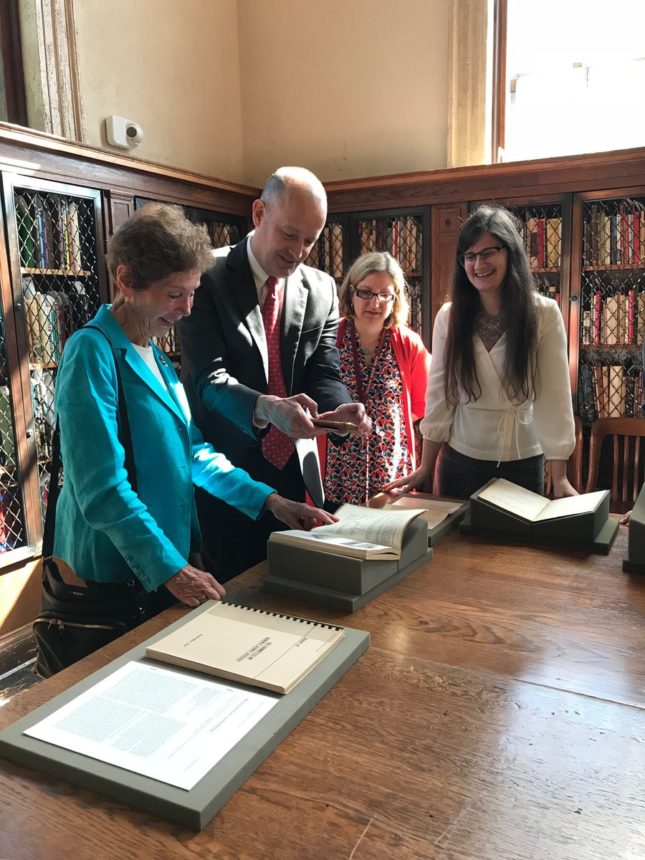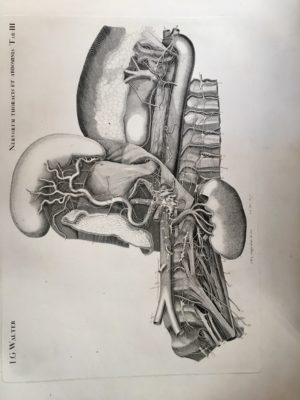Not only was Dr. Benjamin Humphreys, Chief, Division of Nephrology, honored to be the invited speaker for the 20th annual Carl W. Gottschalk Lecture at UNC- Chapel Hill, he was delighted to accept the “perk” that comes with being the guest lecturer.
Dr. Humphreys had the opportunity to tour the Carl W. Gottschalk Collection on the Human Kidney, part of the Rare Book Collection at the Wilson Special Collections Library at UNC-Chapel Hill.

From left, Dr. Susan Fellner (Dr. Gottschalk’s widow), Dr. Benjamin Humphreys, Dawne Lucas (Special Collections Librarian for the Health Sciences Library at UNC), and Dr. Elizabeth Ott (Interim Curator of Rare Books at the Wilson Special Collections Library).
The annual lecture honors Dr. Carl W. Gottschalk, who was on the faculty at UNC from 1952 – 1997. Dr. Gottschalk’s was a pioneer in developing the technique of micropuncture to study kidney function. Early on, he made significant contributions on how the kidney concentrated urine, followed by major works on the mechanism of urine acidification, calcium excretion, potassium depletion, neural control of salt excretion, and glomerular dynamics. He helped set government policies that led to the current federal funding of renal dialysis.

An image of the nerves of the chest and abdomen is from Johann Gottlieb Walter, Tabulae nervorum thoracis et abdominis (Berlin: George Jacob Decker, 1783).
Dr. Gottschalk was also a passionate collector of historical items related to the study of kidneys. After his death, his collection – considered the most comprehensive private collection on the anatomy and physiology of the kidney – was donated to the University Libraries.
Elizabeth Ott, PhD, Interim Curator of Rare Books at the Wilson Special Collections Library, gave Dr. Humphreys a tour of the collection.
“I am always so thrilled to introduce each year’s Gottschalk lecturer to the magnificent rare books, pamphlets, periodicals, photographs, and journal off-prints that make up the Carl W. Gottschalk Collection of the Human Kidney,” says Dr. Ott. “It is a pleasure to share the collection with medical practitioners, who intimately know the history of medicine and offer new and exciting insights into how current medical knowledge about the function of the kidneys compare to historical texts.”
The 12,400-item collection documents the major events in the history of medicine, from the earliest specialized studies of human anatomy to the introduction of kidney dialysis and transplant procedures in the twentieth century. In addition to texts, the collection contains engravings, woodcuts and other relics, some that date to the 16th century.
“The collection also carries with it the rich history of Dr. Gottschalk’s celebrated career, as well as the career of Dr. Gottschalk’s mentor and colleague Jean Oliver, himself an authority on the kidney and an enthusiastic book collector,” says Ott.
Dr. Oliver bequeathed his own collection to Dr. Gottschalk, including the kidney-shaped desk that is now on display in Wilson Library’s Fearrington Reading Room.
The Gottschalk display is viewable by appointment. All books and historic documents in the Gottschalk collection are open to researchers through Wilson Library’s reading room.